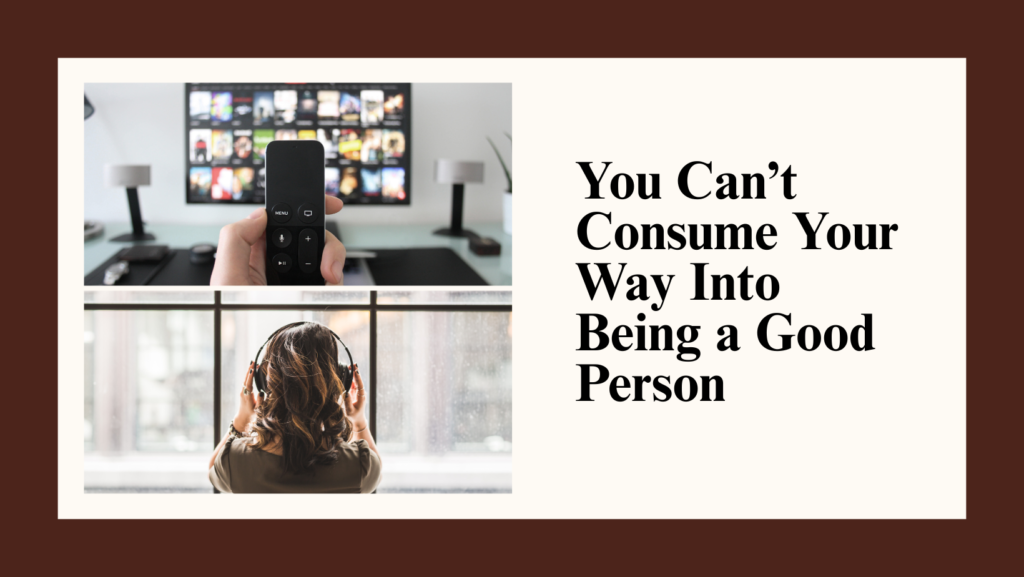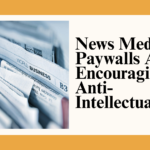As someone pretty heavily focused on the rise of anti-intellectualism, an idea that I keep coming up against is the “let people enjoy things” sentiment. And to be honest, I still find this to be a pretty obnoxious rallying cry and one that avoids anyone taking accountability for still supporting objectively harmful figures like JK Rowling or Chris Brown. But I wanted to explore the glorification of ‘good’ consumption in a stream of consciousness essay and maybe we can reflect together about media, politics, ethics, and our responsibilities to each other.
I recently watched F.D Signifier’s video essay about Beyonce and he briefly touched on this aspect of liberal and leftist in-fighting. The idea that you could tell someone had good or bad politics depending on the media they consumed. What you watch, listen to, and read. And at first, I felt the call out. Because if I find out someone’s favourite artist is Morgan Wallen? Well.
I think the version of me in online spaces is all my negative attributes amplified. Less patient, more stubborn, more judgemental, harsher tongue. And I don’t think I’m unique in this, I think social media is designed to bring these stronger emotions and emotional reactions to the forefront. Considering that Facebook was started as a way to judge the attractiveness of women on college campuses, these spaces were not designed to be inclusive safe havens of community building (or whatever we imagine them to be).
Social media sites rely on your eyes staying glued to them, so emotional responses are what they’re after.
But in the physical world, social norms and shared humanity tend to regulate our responses. If I met someone at a party who told me their favourite artist was Morgan Wallen, to walk away and ignore them would be a very rude thing to do. In a way, I would be ‘forced’ to continue the interaction and in doing so, I would be forced to reckon with my preconceived notions of that person and recognize that they probably have a nuanced understanding of the world, as do I. In fact, we’d probably be singing a ‘I Had Some Help’ duet by the end of the night.
The internet makes us harsh, reactionary, and emotional. It can also make us painfully aware of the inequalities of the world. And when you’re aware of the systemic issues plaguing society, finding connections in art and media can feel like an accessible avenue to share our values and condemn others.
Identity Politics Enters the Chat
Before I waver too deep into an identity politics conversation, let me start by saying this. I have a Master’s degree in social sciences, I have read classic texts on the founding of identity politics, and I think I’m fairly competent to handle conversations of identity politics on an academic front. But as someone who cares about accessibility and public education, this caveat is here to state that the way I’m about to talk about identity politics is related to its modern and digital usage.
Identity politics today has transformed from its modest activist beginnings to a gotcha card to catch people with ‘bad’ politics. What I mean by this is that online spaces overly police the type of content people share and enjoy and characters and celebrities people celebrate or relate to.
Before I sound too critical, let me be clear that diversity and inclusion are noble goals and I truly want a society that reflects these ideals. One where everyone is valued because of their unique experiences. And I do think that in order to get there, we have to get familiar with many types of diversities that can exist among us and I think that media is a great way to do so!
I’ve stated in previous essays that Ellen coming out probably did a lot to change the popular views on LGBTQ people compared to political activism. Media is a phenomenal tool to reflect society back to audiences, and when audiences feel left behind then we know which social issues to flag.
Let’s talk about Friends. For many people, myself included, this show scores big nostalgia points. It is also just one of the most successful sitcoms of all time, but whatever. There have always been criticisms of the show, and now that we have come more decades removed from its airing, criticism has become more common. Two things can be true at once: Friends did not have a diverse cast despite being a show set in one of the most diverse cities in the world AND liking the show does not mean that you have ill will towards people of colour.
It’s crazy to have to say that, I fear. See, we have weaponized critical thinking and identity politics in such a way where we infer that because something does not match our ideals and politics that means people who enjoy it must not match our ideals or politics.
There is certainly something to be said about patterns of media consumption, such as more conservative people enjoying television centered on the nuclear family and country music focused on individual freedoms. We can certainly be drawn into artistic echo chambers.
You Can’t Attribute Morality to Art
Let’s try to draw back to the original point: you can’t consume your way into being a good person. We can critique art to death but let’s be honest, it’s not that fun. I think it’s great to be critical and understand the power structures that influence society. It’s powerful to understand the barriers that affect queer and POC artists and recognize how and why certain stories aren’t told or don’t receive a big platform. Being an informed consumer will always be a good thing, babe!
The truth is, the worst person you know might like Nina Simone. Your homophobic bully was listening to Brat and Chappell Roan all last summer. The kindest person you know might love Frasier and Maroon 5. Everything that we have categorized into “good” or “bad” like I’ve just done, based on social infractions, can’t really be an indication of morality.
Being a conscious consumer means interpreting and reflecting on the lessons in the art we’re consuming. This should be the goal.
The issue with the societal shift to all-or-nothing reactions like cancel culture is that we lose the ability to see the grey. There is a huge difference between watching and liking Friends and watching and supporting the new Harry Potter show. But in identity politics interpretations, both are still seen as problematic.
You can’t consume your way into being a good person, but the choices we make every day of where we give our attention and money do, in part, reflect our values. Watching a show with minorly bad representation is very different from continuing to stream and support R Kelly’s music.
It is not always possible to know the background of the authors, singers, filmmakers, and comedians that we watch. Which is why it is important to engage with work critically. Understand which perspectives are missing or warped, and what message the artist is trying to convey. And when artists show us that they are actively bigoted, I think we can and should walk away.
A quick aside about policing. Speaking to my leftist people here, you gotta stop with the policing. When you say ACAB, remember that policing and social control seep into other areas of life. A word that has been beaten to death is accountability, but I think we need it. Strangers on the internet are not a tool of accountability. Friends, community, mentors, teachers, family are. If you don’t want to support someone because they watch or listen to certain things, hey that’s your right. It’s a weird way to live but we all have our things. But the fights where we drag someone’s name through the mud for guilty-by-association crimes is getting out of hand. You are not the morality police, because there shouldn’t be morality police. I thought we could all agree on that.
Wrapping It Up In A Knot, Not A Bow
So yes, let people enjoy things. But let’s also make better things. Let’s also build our critical thinking skills. Let’s enjoy and be open to learning and hearing other perspectives. There is no playlist, no movie marathon, no TV binge, no painting, no novel that is going to make you a good person.
That said, I think the note I’m wanting to end on is this: art must be balanced by intellectual pursuits. This is a new thought I’m developing through this writing process so it feels a bit wonky right now. But my point is this: if you only consume fictionalized or narrative representations of history, politics, or marginalization then you are lacking part of the story. And the inverse would also be true.
As a staunch non-fiction supporter, I get a little annoyed when I hear fiction readers go on about how they have a better understanding of empathy. The truth is we need both. Developing empathy through narrative and character studies is powerful in reflecting on human experiences but understanding political and historical technicalities helps us understand the world around us.
Sure, you can’t consume yourself into a good person in the sense that there are some morally good pieces of art to associate yourself with. But you can consume your way into being more understanding, empathetic, informed, creative, and insightful by being open to new perspectives and viewpoints.
And hopefully my last point that I want to make is this. Get off the internet. I swear to god, get off. It is wonderful to be able to interact with so many different people! But go have in-person conversations. Remind yourself that people (and you) are flawed and you actually will make mistakes when talking about politics. Consuming art can be great in solitude, and life changing with others. Go to the movies with your friends, join a book club, watch live music. Talk to people about what you consume. Listen to other perspectives. Listen to your own. It’s easy to be perfect on social media, it’s much harder to be vulnerable in person.

